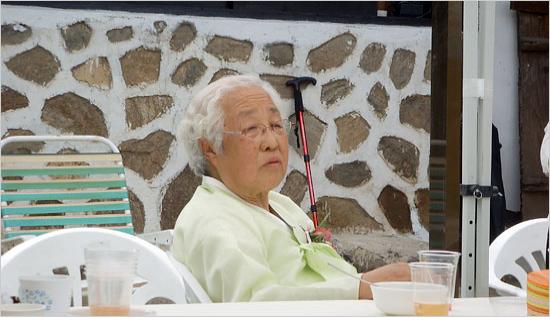Name: admin
2014-01-07 11:26:31 | Hit 1694
Sung Kap Soon, above, attended her 83rd birthday party, where family members shared photos of missing Korean men.
A half-century wait for a husband abducted by North Korea
On June 25, 1962, the 12th anniversary of the outbreak of the Korean War, Sung Kap Soon opened her diary and began to write.
"My dear husband, each night my pillow is soaked with tears of longing for you," the 38-year-old mother of three wrote. "Life goes on, but my body is torn to pieces by thoughts of you."
She noted in her diary that the country had marked the anniversary with a low-key government ceremony but little mention of the tens of thousands of South Korean civilians, including her husband, Ha Kyok Hong, who had been seized and taken away by North Korean troops.
On Monday, too, South Korea observed the war's 57th anniversary with scant comment on the fate of these largely forgotten victims of the war.
To their relatives, however, they have not been forgotten.
On Saturday, Sung's three daughters organized Sung's 83rd birthday party at the cottage of the youngest daughter, Ha Young Nam, in Yongin, 50 kilometers, or 30 miles, south of Seoul. Sung was visiting from Canada, where she moved in 1977 with her eldest daughter. It was more than just a birthday party; it was a time for remembrance.
In addition to family and friends, several relatives of other men who were taken away about the same time as Sung's husband were invited. They brought photographs of their loved ones.
Sung's daughters and grandsons displayed pictures of her and her husband, and showed a videotaped interview friends had conducted with Sung. Christian hymns were sung as light rain alternated with the summer sun outside. "In my dreams, I see him still alive," Sung said.
Sung and her husband married in 1943, when Korea was still under Japanese colonial rule. On Saturday she recalled the day shortly after their engagement when Ha took her to the concert of a well-known Japanese singer and how, afterwards, they walked together through the night. It was snowing but she said she wanted to walk forever.
She also remembered - as she did in her diary entry on her 58th wedding anniversary in 2001 - how the forsythia was in full bloom along the walls of a hospital as she and Ha drove home in a taxi from their April wedding.
The first daughter, Ha Young Hwa, was born in 1946. Two more daughters, Young Sun and Young Nam, followed. The family lived in a two-story house in Seoul and ran a flour mill on the ground floor. "We were a happy family," Sung said.
However, her life changed when Communist forces invaded the South in 1950. The South's ragtag military retreated, and within three days North Korean troops entered Seoul. Before U.S. troops recaptured the city in September 1950, an estimated 83,000 South Korean civilians were taken away by retreating North Korean forces, according to government data.
Nearly all were men, and they included government officials, Christian pastors, educators, judges and businessmen. It is thought that one purpose was to take skilled professionals to the North. Others might have been seized as special enemies.
Sung's husband, 29 at the time, belonged to an anti-Communist, right-wing group. He had evacuated the family to his father's house south of Seoul but was detained in August 1950 when he returned to Seoul to check on the mill.
Sung was 26 then. Her oldest child was 4 years old and the youngest 6 months.
Her diaries, excerpts of which were shown to a reporter on Saturday, captured the dreams and despair of thousands of South Korean women who, like Sung, never remarried, waiting for husbands who never returned.
When the truce was signed in 1953, the warring sides exchanged prisoners of war. But civilian abductees were excluded. The North Korean government insisted it never took any civilians.
The South Korean government drew up a list of civilians believed to have been taken away, and over the years, the names of a few allegedly abducted scholars or writers who disappeared during the war would show up in the North Korean media.
But despite the billions of dollars in aid South Korea has provided to the North in recent years, it has never persuaded the North to reveal the fates of these men.
Sung sent all three daughters to college and rebuilt the house that had been destroyed during the war by selling toilet kits, socks and noodles from street stalls. Using an apple crate as a desk, she began keeping a diary as a way of dealing with her loneliness.
"President Park Chung Hee visited the national cemetery today and the mass media had many programs so that people could remember the tragedies of the war,"
Sung wrote on June 25, 1969. "But there is not a single line in the newspapers about our abducted relatives whose most basic human dignity has been violated. Sometimes I feel bitter about my own country."
In 1951, families of the missing South Koreans formed an organization and campaigned for their relatives' return. But the group was disbanded in 1960 by the strongly anti-Communist and authoritarian South Korean government, which often blacklisted those with relatives in the North as a potential threat.
It was not until after the two Koreas held their first summit meeting in 2000 and agreed to reunions of families separated by the war, that 700 families reestablished their Korean War Abductees' Family Union.
Sung's youngest daughter, Young Nam, is an active member of the union, which is campaigning for a special law that would give government assistance to the abducted men's widows and children, many of whom fell into poverty after losing fathers.
Sung's three daughters, now in their late 50s and early 60s, have little memory of their father. But they remembered their mother often consulting fortunetellers about Ha's fate and doing her best to raise them so that she could be proud when her husband returned. Until she emigrated to Canada, she refused to move from her old home because she believed that Ha one day might show up, her daughters said.
Sung said that she missed her husband most acutely when she saw other children walking hand in hand with their fathers, when other families came together for holidays, or when her daughters rebelled in adolescence and, then, left home one by one for marriage and jobs.
The party on Saturday was the daughters' way of thanking Sung and educating their own children in the family history.
"My dear husband, I don't know whether you are dead or alive," Sung said. "I pray that you and I will be together again in Heaven."
A half-century wait for a husband abducted by North Korea
On June 25, 1962, the 12th anniversary of the outbreak of the Korean War, Sung Kap Soon opened her diary and began to write.
"My dear husband, each night my pillow is soaked with tears of longing for you," the 38-year-old mother of three wrote. "Life goes on, but my body is torn to pieces by thoughts of you."
She noted in her diary that the country had marked the anniversary with a low-key government ceremony but little mention of the tens of thousands of South Korean civilians, including her husband, Ha Kyok Hong, who had been seized and taken away by North Korean troops.
On Monday, too, South Korea observed the war's 57th anniversary with scant comment on the fate of these largely forgotten victims of the war.
To their relatives, however, they have not been forgotten.
On Saturday, Sung's three daughters organized Sung's 83rd birthday party at the cottage of the youngest daughter, Ha Young Nam, in Yongin, 50 kilometers, or 30 miles, south of Seoul. Sung was visiting from Canada, where she moved in 1977 with her eldest daughter. It was more than just a birthday party; it was a time for remembrance.
In addition to family and friends, several relatives of other men who were taken away about the same time as Sung's husband were invited. They brought photographs of their loved ones.
Sung's daughters and grandsons displayed pictures of her and her husband, and showed a videotaped interview friends had conducted with Sung. Christian hymns were sung as light rain alternated with the summer sun outside. "In my dreams, I see him still alive," Sung said.
Sung and her husband married in 1943, when Korea was still under Japanese colonial rule. On Saturday she recalled the day shortly after their engagement when Ha took her to the concert of a well-known Japanese singer and how, afterwards, they walked together through the night. It was snowing but she said she wanted to walk forever.
She also remembered - as she did in her diary entry on her 58th wedding anniversary in 2001 - how the forsythia was in full bloom along the walls of a hospital as she and Ha drove home in a taxi from their April wedding.
The first daughter, Ha Young Hwa, was born in 1946. Two more daughters, Young Sun and Young Nam, followed. The family lived in a two-story house in Seoul and ran a flour mill on the ground floor. "We were a happy family," Sung said.
However, her life changed when Communist forces invaded the South in 1950. The South's ragtag military retreated, and within three days North Korean troops entered Seoul. Before U.S. troops recaptured the city in September 1950, an estimated 83,000 South Korean civilians were taken away by retreating North Korean forces, according to government data.
Nearly all were men, and they included government officials, Christian pastors, educators, judges and businessmen. It is thought that one purpose was to take skilled professionals to the North. Others might have been seized as special enemies.
Sung's husband, 29 at the time, belonged to an anti-Communist, right-wing group. He had evacuated the family to his father's house south of Seoul but was detained in August 1950 when he returned to Seoul to check on the mill.
Sung was 26 then. Her oldest child was 4 years old and the youngest 6 months.
Her diaries, excerpts of which were shown to a reporter on Saturday, captured the dreams and despair of thousands of South Korean women who, like Sung, never remarried, waiting for husbands who never returned.
When the truce was signed in 1953, the warring sides exchanged prisoners of war. But civilian abductees were excluded. The North Korean government insisted it never took any civilians.
The South Korean government drew up a list of civilians believed to have been taken away, and over the years, the names of a few allegedly abducted scholars or writers who disappeared during the war would show up in the North Korean media.
But despite the billions of dollars in aid South Korea has provided to the North in recent years, it has never persuaded the North to reveal the fates of these men.
Sung sent all three daughters to college and rebuilt the house that had been destroyed during the war by selling toilet kits, socks and noodles from street stalls. Using an apple crate as a desk, she began keeping a diary as a way of dealing with her loneliness.
"President Park Chung Hee visited the national cemetery today and the mass media had many programs so that people could remember the tragedies of the war,"
Sung wrote on June 25, 1969. "But there is not a single line in the newspapers about our abducted relatives whose most basic human dignity has been violated. Sometimes I feel bitter about my own country."
In 1951, families of the missing South Koreans formed an organization and campaigned for their relatives' return. But the group was disbanded in 1960 by the strongly anti-Communist and authoritarian South Korean government, which often blacklisted those with relatives in the North as a potential threat.
It was not until after the two Koreas held their first summit meeting in 2000 and agreed to reunions of families separated by the war, that 700 families reestablished their Korean War Abductees' Family Union.
Sung's youngest daughter, Young Nam, is an active member of the union, which is campaigning for a special law that would give government assistance to the abducted men's widows and children, many of whom fell into poverty after losing fathers.
Sung's three daughters, now in their late 50s and early 60s, have little memory of their father. But they remembered their mother often consulting fortunetellers about Ha's fate and doing her best to raise them so that she could be proud when her husband returned. Until she emigrated to Canada, she refused to move from her old home because she believed that Ha one day might show up, her daughters said.
Sung said that she missed her husband most acutely when she saw other children walking hand in hand with their fathers, when other families came together for holidays, or when her daughters rebelled in adolescence and, then, left home one by one for marriage and jobs.
The party on Saturday was the daughters' way of thanking Sung and educating their own children in the family history.
"My dear husband, I don't know whether you are dead or alive," Sung said. "I pray that you and I will be together again in Heaven."






















 FAX : (82)31-930-6099
FAX : (82)31-930-6099
